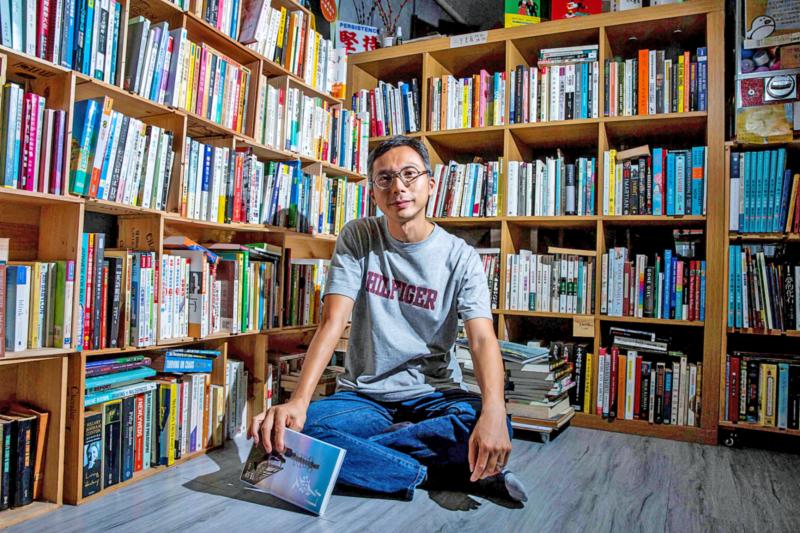Once renowned for world-class cinema, Hong Kong’s film industry was already struggling before the latest hurdle — Chinese mainland-style censorship as authorities take their purge of dissent into the cultural sphere.
Filmmaker Mok Kwan-ling’s (莫坤菱) heart sank when the e-mail from the government censors dropped.
In June, authorities announced all films would now be scrutinized for “national security” breaches. Mok’s was the first known to have fallen foul of these rules. For months, she had been putting together her debut, a 27-minute drama inspired by the many young couples she encountered during huge democracy protests two years ago.

Photo: AFP
It tells the story of a young woman meeting her boyfriend’s parents after he is arrested for taking part in the protests. The boyfriend’s mother is opposed to the movement, his father sympathetic.
The Cantonese title Zap Uk (literally “clean up the house”) is a reference to how friends and family would often remove any incriminating items once a loved one was arrested.
However, Mok said Hong Kong’s film censors were not happy with what was submitted and ordered her to make 14 cuts.
Among the changes they demanded was removing a line from the father saying their son was a first aid volunteer who was “only out there to save the people,” as well as deleting a scene where the same character, a truck driver, charges protesters a discounted fare.
The censors also demanded the film be renamed and carry a warning that it showed criminal offenses.
“I thought the story was rather balanced by presenting voices of two sides,” Mok said. “It turned out that one particular side is not allowed to be heard.”
Mok felt the cuts would leave her film “devoid of essence and sense,” so she put it aside for now.
“My film happened to be the first, but it won’t be the last,” she said.
Agence France-Presse has contacted Hong Kong’s Film Censorship Authority for comment.
In the 1980s and 1990s, Hong Kong was known as “The Hollywood of the Far East,” with a cast of globally recognized stars like Chow Yun-fat (周潤發) and auteurs such as Wong Kar-wai (王家衛). The golden age of Cantonese cinema has long been eclipsed by the rise of mainland Chinese and South Korean films, but the territory maintained a vibrant indie scene, shielded by free speech protections that allowed directors to tackle subjects that would be untouchable on the authoritarian mainland.
Those days are now over.
China is rapidly remolding Hong Kong in its own image after the democracy protests, and films are just the latest in a long list of targets.
On top of the new scrutiny rules, a law making its way through the legislature will expand censorship to films previously given clearance, as well as tightening the punishment for breaches.
Kiwi Chow (周冠威) was one of five directors who contributed short stories for Ten Years (十年). The 2015 film painted a dystopian portrait of what Hong Kong might look like in a decade with Beijing stifling freedoms and the territory’s Cantonese culture. As well as being prescient, Ten Years was a commercial hit and won best film at Hong Kong’s annual awards. However, it is unlikely that a production like that could now be made — or even shown.
“They are trying to clamp down on our memory and imagination,” Chow said.
Kiwi Chow’s latest project, Revolution of Our Times, is a two-and-a-half-hour-long documentary on the 2019 protests.
Organizers secretly added it to the Cannes Film Festival lineup earlier this summer — only once the mainland Chinese films had been shown.
However, Kiwi Chow said he has given up any hope of showing it in Hong Kong.
“If it is dangerous and risky for filmmakers to touch upon social issues ... then I could only screen it outside Hong Kong,” he said.
To protect himself, he said, he has sold the copyright and disposed of all locally held footage. The production team, collaborators and financial backers have chosen to remain anonymous.
Still, some investors and actors have backed out of his non-political productions and a recent screening of a romance he made was raided by police.
Fear of angering Beijing has long fueled self-censorship in Hong Kong’s arts, but mainland-style blacklisting of those who speak out is now also happening. Earlier this month, pro-democracy pop star Denise Ho (何韻詩) was forced to cancel her concert after the venue pulled out, citing “public security” concerns just days before her performance.
However, Kiwi Chow predicts censorship will do little to change Hong Kongers’ desire for a greater say in how their homeland is run and smacks of weakness.
“The more is banned in the name of national security, the less secure the state will be,” he said.

Philippine President Ferdinand Marcos Jr has fired his national police chief, who gained attention for leading the separate arrests of former Philippine president Rodrigo Duterte on orders of the International Criminal Court and televangelist Apollo Carreon Quiboloy, who is on the FBI’s most-wanted list for alleged child sex trafficking. Philippine Executive Secretary Lucas Bersamin did not cite a reason for the removal of General Nicolas Torre as head of the 232,000-member national police force, a position he was appointed to by Marcos in May and which he would have held until 2027. He was replaced by another senior police general, Jose

STILL AFLOAT: Satellite images show that a Chinese ship damaged in a collision earlier this month was under repair on Hainan, but Beijing has not commented on the incident Australia, Canada and the Philippines on Wednesday deployed three warships and aircraft for drills against simulated aerial threats off a disputed South China Sea shoal where Chinese forces have used risky maneuvers to try to drive away Manila’s aircraft and ships. The Philippine military said the naval drills east of Scarborough Shoal (Huangyan Island, 黃岩島) were concluded safely, and it did not mention any encounter with China’s coast guard, navy or suspected militia ships, which have been closely guarding the uninhabited fishing atoll off northwestern Philippines for years. Chinese officials did not immediately issue any comment on the naval drills, but they

POWER CONFLICT: The US president threatened to deploy National Guards in Baltimore. US media reports said he is also planning to station troops in Chicago US President Donald Trump on Sunday threatened to deploy National Guard troops to yet another Democratic stronghold, the Maryland city of Baltimore, as he seeks to expand his crackdown on crime and immigration. The Republican’s latest online rant about an “out of control, crime-ridden” city comes as Democratic state leaders — including Maryland Governor Wes Moore — line up to berate Trump on a high-profile political stage. Trump this month deployed the National Guard to the streets of Washington, in a widely criticized show of force the president said amounts to a federal takeover of US capital policing. The Guard began carrying

Ukrainian drone attacks overnight on several Russian power and energy facilities forced capacity reduction at the Kursk Nuclear Power Plant and set a fuel export terminal in Ust-Luga on fire, Russian officials said yesterday. A drone attack on the Kursk nuclear plant, not far from the border with Ukraine, damaged an auxiliary transformer and led to 50 percent reduction in the operating capacity at unit three of the plant, the plant’s press service said. There were no injuries and a fire sparked by the attack was promptly extinguished, the plant said. Radiation levels at the site and in the surrounding